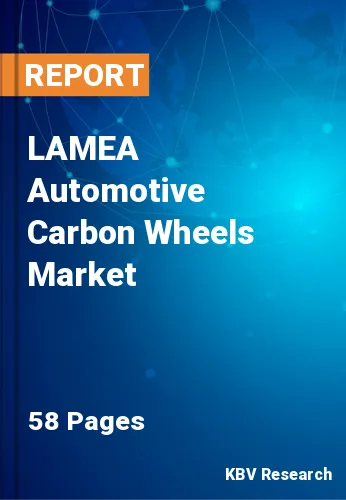The Latin America, Middle East and Africa Automotive Carbon Wheels Market would witness market growth of 11.2% CAGR during the forecast period (2022-2028).
CFRPs have traditionally been employed in defence, aerospace, defence, and racing applications, but they are now finding the latest applications in the marine, automotive, energy (for example, wind blades), industrial components, and other fields. The most attractive application field for composites is automotive, which has the largest development potential. Several major automakers, like BMW and Mercedes, are considering or have already begun to extend their production of fuel-effectiveness vehicles by employing carbon fibres to reduce weight. These initiatives are expected to propel the CFRP market in the automotive industry to the forefront.
Lightweight wheels are possibly the single most important performance upgrade companies can make to the car. The gyroscopic effect, according to basic physics, necessitates a large amount of effort to shift a spinning item - the heavier the object, the more effort is necessary. Companies can run faster and change directions more precisely with lighter, firmer wheels. Because no wheel is lighter than a CR-9, anyone can precisely place their automobile with less effort and more input.
South Africa is ranked 22nd in the world for automobile manufacture, with a 0.58 percent market share. On the back of enhanced foreign direct investment and trade, the South African automotive industry's growth strategies were concentrated on becoming fully connected into the global automotive environment. The goal of the South African Automotive Masterplan (SAAM) 2021-2035 is for South Africa to generate 1% of worldwide vehicle production, or 1,4 million automobiles per year, by 2035, significantly improving the country's standing and global vehicle production ranking.
As a result, the automotive industry is playing an extremely essential strategic & catalytic part in the South African economy, influencing numerous key policy goals directly, including GDP contribution, skills development, employment, technology, economic linkages, and innovation. The manufacturing, servicing, distribution, and regular maintenance of motor vehicles and components are all part of the South African automotive sector. Original equipment manufacturers (OEMs), authorized dealers, and repair specialists collaborate closely to provide maintenance and repairs. They focus on ensuring warranty service, environmental protection, driver safety, spare parts accessibility, and technical development information. These determinants would fuel the growth of the regional automotive carbon wheels market over the forecast period.
The Brazil market dominated the LAMEA Automotive Carbon Wheels Market by Country in 2021, and would continue to be a dominant market till 2028; thereby, achieving a market value of $15.5 million by 2028. The Argentina market is anticipated to grow at a CAGR of 11.8% during (2022 - 2028). Additionally, The UAE market would showcase a CAGR of 10.9% during (2022 - 2028).
Based on Distribution Channel, the market is segmented into OEM and Aftermarket. Based on Vehicle Type, the market is segmented into Passenger Cars, Commercial Vehicles, and Two Wheelers. Based on countries, the market is segmented into Brazil, Argentina, UAE, Saudi Arabia, South Africa, Nigeria, and Rest of LAMEA.
Free Valuable Insights: The Global Automotive Carbon Wheels Market is Predict to reach $1 Billion by 2028, at a CAGR of 9.2%
The market research report covers the analysis of key stake holders of the market. Key companies profiled in the report include Carbon Revolution Ltd., Thyssenkrupp AG, Hitachi Metals, Ltd. (Hitachi, Ltd.), Dymag Group Limited, HRE Performance Wheels, Litespeed Racing Inc., Rolko Kohlgrüber GmbH, Ronal Group, Rotobox d.o.o., and ESE Carbon Company.
By Distribution Channel
By Vehicle Type
By Country
Our team of dedicated experts can provide you with attractive expansion opportunities for your business.

